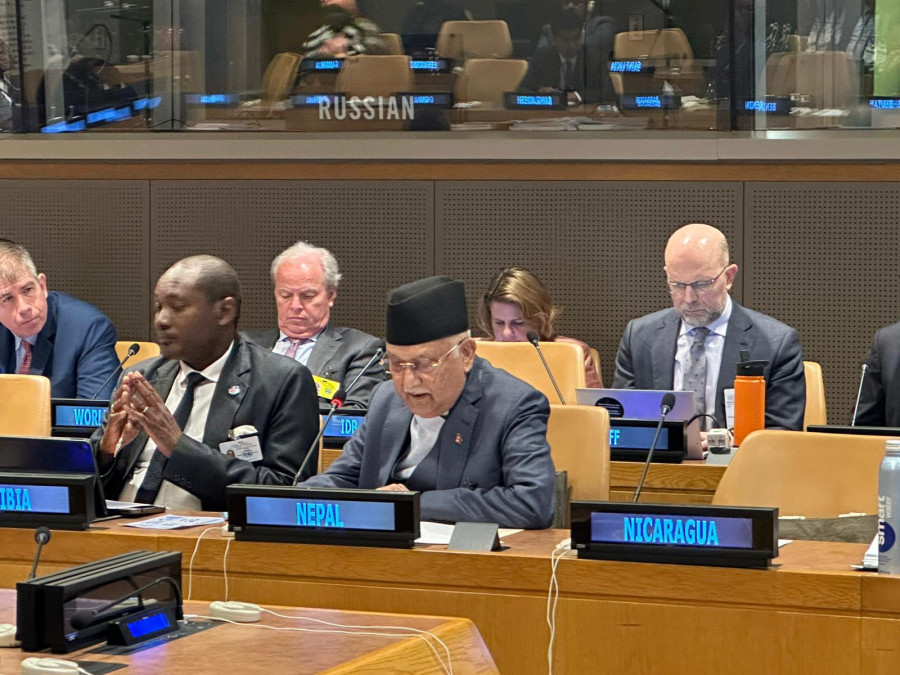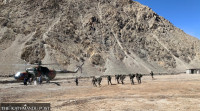National
Prime Minister Oli calls for global climate justice at UN meeting
The prime minister highlights severe climate impacts on vulnerable nations, demands responsibility from major emitters.
Post Report
Prime Minister KP Sharma Oli has called for global climate justice, urging major carbon-emitting nations to take responsibility for their contributions to climate change.
Speaking at the Climate Vulnerable Forum (CVF) Leaders Meeting during the 79th session of the United Nations General Assembly, Oli emphasised the disproportionate impacts of climate change on vulnerable countries like Nepal.
“Climate change is the defining crisis of our time. Nepal, being a country with young mountains and a least developed one, is facing increased climate-induced disasters at a greater scale and intensity,” he said.
The prime minister highlighted the alarming retreat of glaciers in the Himalayas, noting that the region’s vast reserves of snow, which are critical lifelines for billions of people across Asia, are receding at an unprecedented rate due to rising global temperatures.
“Our vast reserve of snow in the Himalayas, critical lifelines for billions of people, are receding at an alarming scale and speed,” he said.
He further said that in recent months, climate-induced disasters in Nepal have claimed over 200 lives and devastated entire communities and local economies. Citing a report, Oli said that Nepal ranked 10th among the countries most affected by extreme weather events between 2000 and 2018.
“This is a profound injustice, considering that our greenhouse gas (GHG) emissions are insignificant, our 46 percent forest cover contributes to carbon sinking, and we have the Himalayas working as natural refrigerators,” he said, stressing the unfairness of climate impacts on nations like Nepal that contribute minimally to global emissions.
The prime minister strongly appealed to major carbon-emitting countries to address the consequences of their historical and ongoing emissions. “We call on the major emitters to take responsibility for ensuring climate justice, providing financial resources, transferring technology, and helping developing countries in adaptation and resilience building,” he said.
The prime minister also emphasised the need for a fair and accessible financing mechanism for climate action, stating that the world must take urgent measures to limit global warming to 1.5°C, as outlined in the Paris Agreement.
“The global warming must be limited to 1.5˚ Centigrade, as pledged in the Paris Agreement, as the stake is nothing less than the survival of people and the planet,” he said.
Reaffirming Nepal's commitment to climate action, Oli said that the country aims to achieve net-zero emissions by 2045, five years ahead of the global target.
“Nepal is committed to the Paris Agreement. We aim to achieve net-zero emissions by 2045,” he said.
He added that Nepal is actively implementing strategies to decarbonise its economy and has designated 23 percent of its total land as conservation areas.
During his speech, the prime minister also called for climate finance to be separated from traditional development assistance, emphasising that climate finance should be concessional to prevent vulnerable nations from incurring unsustainable debts for climate action.
“Climate finance must be additional to development finance. And it must be concessional, as it is a gross injustice for developing countries to incur loans for climate action, while the climate change is largely a result of the burning of fossil fuels by the industrialised nations during their economic development,” he said.
Prime Minister Oli also addressed the issue of “loss and damage,” an area of increasing focus in international climate negotiations, calling for swift action to address the economic and non-economic losses suffered by countries due to climate change impacts. “Loss and damage must also be addressed with urgency,” he said.




 21.45°C Kathmandu
21.45°C Kathmandu














